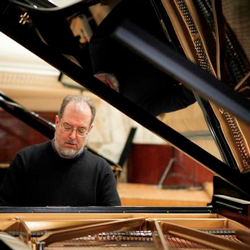by Daniel Hathaway

The main event was a selection of character pieces, etudes and sonatas marking the centennial of the death of Alexander Scriabin, a musical figure so eccentric that Ohlsson devoted a seven-minute talk to the subject of “one of music’s great megalomaniacs” after playing Scriabin’s Désir to begin the second half of the concert.
Born on Christmas Day and laid to rest on Easter, Scriabin may have been the Russian esthete closest to the spirit of Oscar Wilde. Everything he said, did and wrote was suffused with a rapturous, perfumed ecstasy that expressed itself musically in extreme chromaticism. He slept, Ohlsson said, with the music of Chopin under his pillow.
All of those characteristics might make Scriabin’s music cloying if it weren’t so varied and inventive. Désir’s persistent motives; the leaping figures, endless trills and explosions of Sonata 10, op. 70; the languorous, meditative quality of the Étude in b-flat, op. 8, no. 11; the scherzo-like bravura of the Étude in D-flat, op. 8, no. 10; the vaporous Fragilité, op. 51, no. 1; the brilliant gestures and jumpy episodes of Sonata No. 5 in F-sharp, op. 53 — all these arresting features added up to a carefully curated exhibition of works by a composer with whom Garrick Ohlsson has a signal affinity. He played the six pieces with luminous intensity and added a bit of showbiz to the ending of op. 53, leaping off the bench to its final flourish of notes.
A foot-stamping ovation brought forth three more Scriabin selections: a lovely, simple Étude he wrote at the age of 15, another involving a dizzy, non-stop string of sotto voce notes, and a third that Ohlsson called Scriabin’s most famous piece.
On the first half of the program, enroute to Scriabin, Ohlsson programmed Beethoven’s Sonata in E, op. 109 and Schubert’s “Wanderer” Fantasy, two works just about as far from the voluptuous universe of the Russian composer as you can imagine.
Ohlsson took a while to get into the flow of his recital. The Beethoven sounded labored. Passages meant to be humorous turned out steely and prim, and the final Prestissimo suffered a few too many tangles.
Schubert’s Fantasy, based on one of the composer’s songs and set in four continuous movements, began heartily, turned brooding in the Adagio and startlingly bass-heavy in the Presto. The final fugue was impressively ominous.
Garrick Ohlsson finally seemed to be relaxing and enjoying himself when he turned to Scriabin. His playing became effortlessly virtuosic, amusing and witty. That clearly came across to the audience, who requested and enjoyed extra helpings of Scriabin at the end.
Published on ClevelandClassical.com February 17, 2015.
Click here for a printable copy of this article



